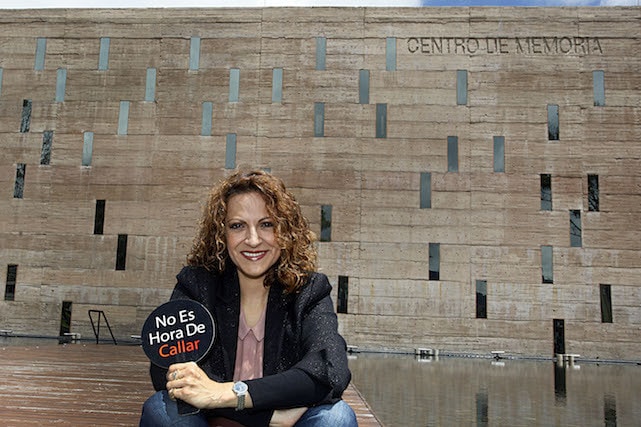On the body of journalist Jineth Bedoya Lima are the marks of a war that, much like her, many victims in the country have endured. Her story is set deep in her eyes and her words represent the dignity of a survivor who fights for truth and justice.
The following is a translation of a statement originally published on flip.org.co on 25 May 2016.
On the body of journalist Jineth Bedoya Lima are the marks of a war that, much like her, many victims in the country have endured. Her story is set deep in her eyes and her words represent the dignity of a survivor who fights for truth and justice, for herself and for many other women.
At a public event in 2014, the president of Colombia, Juan Manuel Santos, announced Decree 1480 which established this day – May 25 – as National Day for the Dignity of Victims of Sexual Violence. This date symbolizes the hard work of journalist Jineth Bedoya Lima, who was kidnapped 16 years ago at the entrance of the La Modelo de Bogotá jail, while going to interview a paramilitary known by the alias ‘El Panadero.’ Before entering the penitentiary, three men got into her car, and they drugged and kidnapped her for 16 hours, during which she was tortured, raped and finally thrown out onto a street corner.
That day, Jineth started a long journey in search of the truth and justice that has not yet come to an end, 16 years later. Her case was finally declared a crime against humanity by the Public Prosecutor’s Office in September of 2014, due to the fact that she was the victim of these attacks because she is a journalist and a woman.
In a presentation at a public hearing before the IACHR on April 5, 2016, the journalist stated that “I opted to survive and opted to fight for my case and continue to do journalism; I opted to make visible the cases of thousands of women that, as have I, remain crippled by the lack of justice and the [perpetrators’] impunity.”
Before the events of May 25, Jineth had already been a victim of multiple threats and one attempt was made on her life; however, the State failed to take the necessary measures to protect her.
In 2009, Jineth started a campaign called ‘No es hora de callar’ (It’s not time to be silent), together with other women with similar stories of abuse, in which they work to break their silence and denounce the events to which they have fallen victim.
In Colombia, according to figures from the Victims Unit, it is estimated that 3.4 million victims of the 6.9 million caused by the armed conflict in Colombia – in its more than 50 years of history – are women. Of these [victims], Medicina Legal has indicated that, between 1985 and 2014, 6,900 cases of abuse were recorded and of these cases, 90% were against women.
La Casa de la Mujer reports 489,678 cases where women have been victims of sexual violence, between 2001 and 2009, at the national level. Of these, 402,264 did not file a report against their attackers; that is to say, around 82.15%, due to the presence of armed groups in their municipalities.
“In 2008, the Constitutional Court of Colombia sent an urgent message to the Public Prosecutor’s Office of the Nation, demanding that they prioritize 183 cases of sexual violence, among which is my case; it is number 62. Eight years later, impunity for these cases is at 97%, and I’m part of this statistic,” said Jineth.
FLIP (Foundation for Press Freedom) highlights the fight that Jineth has led as a survivor and as an activist for the rights of women who are victims of sexual violence, which also vindicates the arduous task of many women who seek truth and justice.
Finally, on this date the Colombian State is once again being urged to fulfill its obligations to combat impunity in the case of journalist Jineth Bedoya Lima. Though this day is a big step in the fight she has led for the recognition of her rights as a victim, and those of other women, this does not mean that the State can avoid its obligations to truth and justice.



